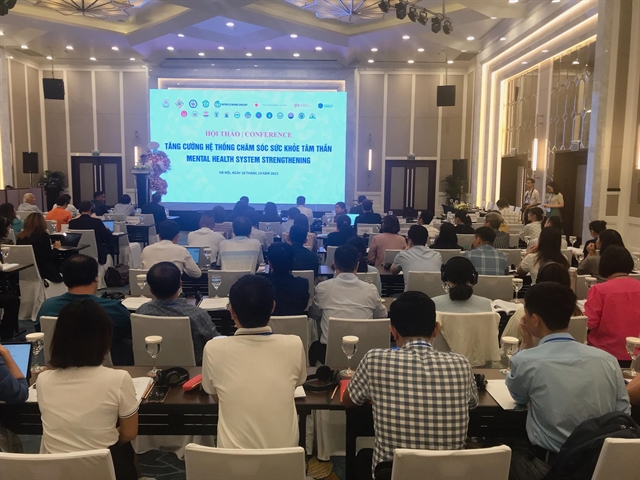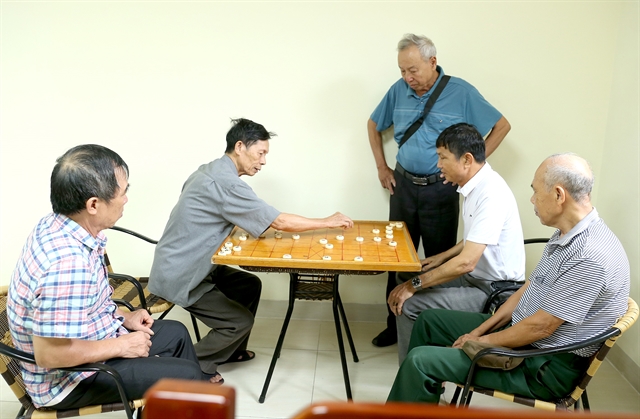 Society
Society


|
| People mark the International Day of Happiness with a running festival in Quảng Ninh northern province on March 20 this year. — VNA/VNS Photo Thanh Vân |
Thu Trang
HÀ NỘI — Today’s more developed society has expanded both the need for mental health care and the treatment options, experts said at a conference in Hà Nội.
The conference on strengthening mental health systems was organised on Tuesday by the Ministry of Health, the National Institute of Mental Health (NIMH) and other partners.
In conference discussions, experts agreed that social development brought stress and pressure related to the economy, work and family burdens.
With digital technology, young people are susceptible to mental health problems related to accessing unhealthy online platforms, which are numerous and difficult to manage.
Lê Hồng Trung, director of the Vĩnh Phúc Department of Health, said the perspectives of patients, families and society about mental health diseases are still limited.
“They are shy, do not want treatment or cannot accept that they or their family member have mental health problems,” said Trung.
Thus, it is difficult to recruit doctors to work at psychiatric hospitals. As a result, the sector faces a lack of young human resources.
Trung added that in Vĩnh Phúc Province as in many other localities, facilities for mental health care were degraded and could not meet the increasing needs for patient care and treatment, such as gymnasiums and treatment rooms.
Hospitals’ campuses are large with many trees but have not been optimally designed for use in treatment.
Moreover, psychotherapy and non-pharmacological treatment methods have not yet been well developed.
With the same view, Associate Professor Nguyễn Văn Tuấn, director of the NIMH, said that mental disorders accounted for 14 per cent of the global disease burden, and Việt Nam had 10.3 million people in need of mental health care.
So the country was in real need of human resources to provide health care for the people.
But in fact, it lacks high-quality human resources and lecturers for the health care field.
One more problem was that the medical workers and training institutions are unevenly distributed.
They are often concentrated in main cities such as Hà Nội and HCM City, with few in the northern mountainous, Central Highlands and southwest areas.
Training programmes were only focused on university curriculum, with limited pathways for post graduate studies, Tuấn said.
There has been no study on the necessary content, composition and duration of training programmes for the major.
Khine Pwint Nwe, founder and chief executive officer of the Z-waka Pte Ltd, said, “Myanmar has hundreds of practicing psychiatrists, but the number of psychologists can be counted on the fingers of one hand.”
Only 10 to 15 people in every 100 receive the care they need and there is only one working psychiatrist for every 260,000 people, she said.
Opportunities

|
| An overview of the conference. — VNS Photo Thu Trang |
But the new era also opens opportunities for mental healthcare, representatives at the conference said.
Many new treatment methods were available for specialised medical workers to use as reference, and residents can more easily access treatments and other services.
Both medical workers and the people can take advantage of online platforms to raise awareness about mental health’s importance.
They can also apply digital technology in therapy.
Dutsadee Juengsiragulwit, director of the Bureau of Mental Health Service, Department of Mental Health under the Thailand Ministry of Public Health, said that mental health care at schools was taken care of on a digital platform.
A school health and educational reintegrating operation (SchoolHealthHERO) was founded in her country as an intersectoral collaboration between the health and education sectors.
“It is a timely and user-friendly innovative digital platform for mental health surveillance, support and care for vulnerable students in schools,” she said.
Thanks to the platform, 20,480 at-risk students were under collaborative care between the school and health sectors via 681 HERO consultants.
Future plan

|
| The elderly participate in a chess club in Lào Cai northern mountainous province. — VNA/VNS Photo Quốc Khánh |
Director Trung proposed building a monitoring and early detection system while continuing to organise and deploy mental health management activities in the community.
“Mentally ill people should be managed and treated in the community according to family medicine principles,” he said.
He suggested completing the management software for mentally ill people so it can be applied in all localities, and establishing contact channels between medical facilities to ensure convenience and ease of access for people when they have mental health-related needs.
Jinsuda Phabmixay, deputy head of the Mental Health Department under the Mahosot Hospital in Vientiane, Laos, had another idea.
She desired collaboration with development partners and other countries for knowledge sharing, study visits, short- and long-term training, technical assistance and research.
Tô Đức, director of the Department of Social Protection under the Ministry of Labour, Invalids and Social Affairs, said that the social support programme for mentally ill people, autistic children and people with mental disorders in the period of 2021-30 was approved by the Prime Minister.
Under the programme, society, especially families and communities, will work together to increase material and spiritual support, care and rehabilitation for mentally ill people.
“It will supply screening, detecting and preventive measures, ensuring social security and improving the quality of social support services,” he said.
The programme targets delivering medical services in different forms to about 90 per cent of mentally ill people by 2030. At least 70 per cent of social assistance facilities taking care of mentally ill people will have fitness, sports, cultural and art clubs.
At least 60 per cent of families with mentally ill members will have improved awareness and skills in care, support and community-based rehabilitation for them.
At least 70 per cent of social workers and collaborators in the field of mental healthcare at the grassroots level and in the community will have training to improve their capacity.
With funds from the State and local budget, and legal support from domestic as well as international organisations and individuals, the programme will research and compile manuals to support families with mentally ill people and adolescents.
A monitoring system would also be developed for them, Đức said.
The programme will also conduct research to learn from the experiences of countries in the region, and organise competitions to spread information and knowledge related to mental healthcare.
Currently in Việt Nam, the number of people with mental disorders is estimated at 10.5 per cent of the population, equivalent to 10.3 million people, according to statistics of the Ministry of Labour, Invalids and Social Affairs.
The country has 45 social protection facilities providing care and rehabilitation for mentally ill people. — VNS




